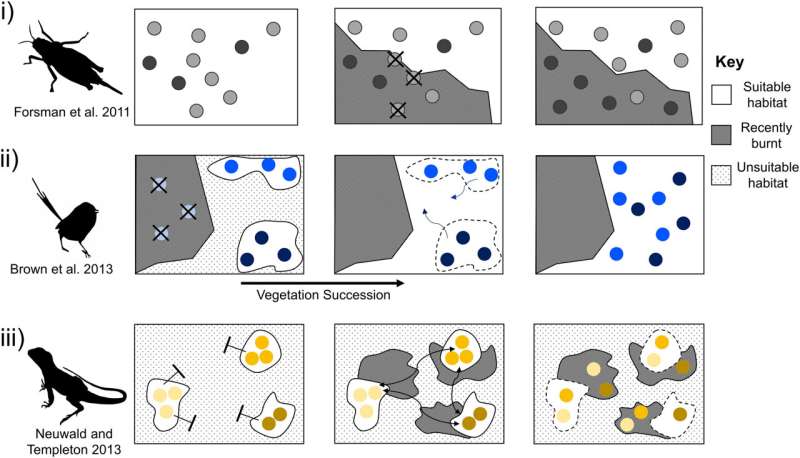This article has been reviewed according to Science X's editorial process and policies. Editors have highlighted the following attributes while ensuring the content's credibility:
fact-checked
peer-reviewed publication
trusted source
proofread
Fire regimes can change genetic patterns of animal species, study finds

Monash University scientists have called for the increased integration of genetic research into the field of fire ecology to ensure that conservation management decisions are well-informed.
The call follows a study led by researchers from the Monash University School of Biological Sciences that shows that both anthropogenic and natural fire regimes have the capacity to impact genetic patterns of animals.
The study, published in Biological Conservation is led by Professor David Chapple, Associate Professor Jane Melville and Ph.D. candidate Jaclyn Harris.
The research team collated global research on the impacts of fire regimes on genetic patterns of fauna by conducting a systematic literature search on the Web of Science on 20 September 2021.
"Local fire regimes have a defining role in shaping faunal diversity and demographic trends," said Jaclyn.
As fire regimes are changing globally, due to anthropogenic activity and climate change, understanding the full impact of fire regimes is becoming increasingly important.
"There is great conservation significance in using genetic or genomic studies to learn how fire affects endangered species," she said.
The existing research typically focuses on the implications of fire regimes on species abundance and diversity, with limited understanding of the genetic consequences.
"Our study found that different fire regimes have the potential to change a variety of genetic patterns through molding natural selection, survival and reproduction strategies, and dispersal mechanisms," said Jaclyn.
"Our research shows that fire regimes alter the genetic patterns of fauna at an individual, population, and meta-population scale, despite the minimal empirical research that has been conducted on the topic," said Professor Chapple.
"It highlights the necessity for the increased integration of genetic research into the field of fire ecology to ensure that management decisions are well-informed," he said.
Only 37 papers were found by the research team to have empirically examined the genetic impacts of fire on fauna or that attributed genetic patterns to be a consequence of fire regimes.
"Inappropriate fire regimes can have a deleterious effect on endangered species." It is hoped that by including genetic approaches, researchers can inform practitioners on how endangered animals react to natural and human-caused fires.
More information: Jaclyn Harris et al, Genetic footprints of fire: Understanding the genetic implications of fire regimes for fauna and effective conservation strategies, Biological Conservation (2023). DOI: 10.1016/j.biocon.2023.110169
Journal information: Biological Conservation
Provided by Monash University

















